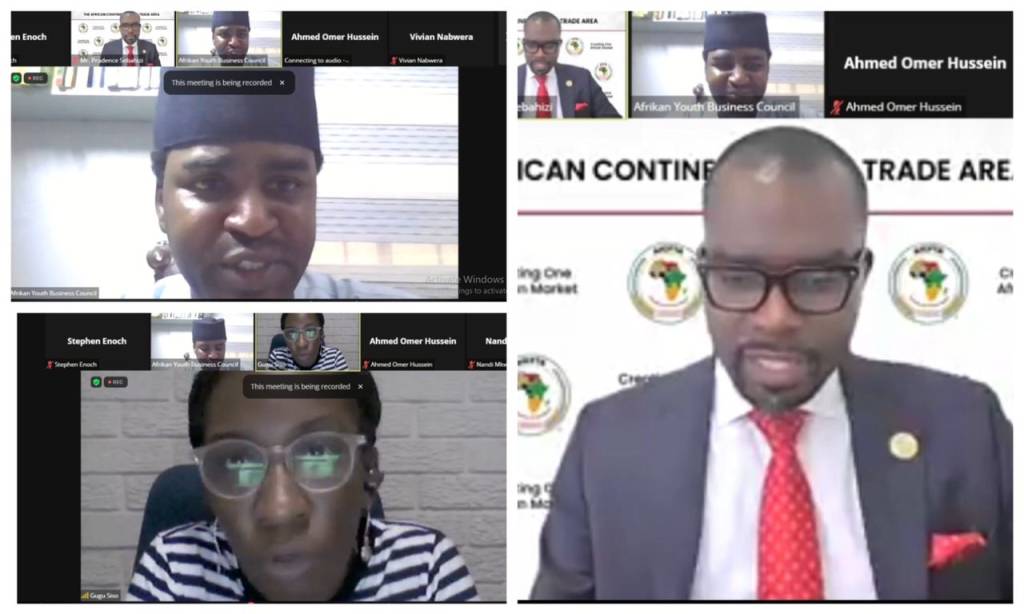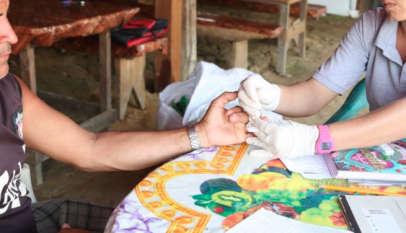Day AfYBC Launched its Enterprise Development Webinar Series
In a bid to empower young entrepreneurs across the African continent, the Afrikan Youth Business Council (AfYBC) last week launched its Enterprise Development Webinar Series, with the inaugural webinar focused on the newly adopted AfCFTA Protocol on Women and Youth in Trade.

The inaugural webinar, which was hosted in collaboration with the Independent Continental Youth Advisory Council (ICOYACA) was themed: “Demystifying the AfCFTA Protocol on Women and Youth in Trade,” featured insightful discussions and reflections on the transformative potential of the African Continental Free Trade Area (AfCFTA) for Africa’s young entrepreneurs.
AfYBC, the continental apex body for youth-led private sector entities, institutions and associations, is at the forefront of efforts to empower Africa’s young entrepreneurs and foster economic growth in the AfCFTA era. The Council’s vision is to foster Africa’s socioeconomic transformation through a youth-friendly economic and trade policy regime that promotes fair trade, fair competition, and connectivity for young African entrepreneurs.
At its core, the AfYBC is committed to driving entrepreneurship among Africa’s youth, in recognition of the pivotal role young entrepreneurs play in the continent’s economic landscape. By providing mentorship, training, and networking opportunities, the Council seeks to empower young entrepreneurs to realize their business aspirations and contribute to Africa’s sustainable development.
One of the key initiatives being spearheaded by the AfYBC is advocacy for youth inclusion in the African Continental Free Trade Area (AfCFTA), a landmark agreement aimed at creating a single continental market for goods and services in Africa. Through webinars, capacity building workshops and advocacy campaigns, the Council seeks to demystify the AfCFTA and its various protocols highlighting its transformative potential for Africa’s young people.
Among others, the objectives of the maiden webinar were to foster a comprehensive understanding of the AfCFTA Women and Youth Protocol and its benefits for Africa’s young entrepreneurs. To this end, the webinar also highlighted potential obstacles to youth in trade under the AfCFTA and proffers strategies for overcoming them, empowering youth entrepreneurs with the requisite knowledge, skills, and resources to effectively navigate intra-African trade under the AfCFTA.
Mr Prudence Sebahizi, Director of Institutional Matters and Programs Coordination (DIMPC) at the AfCFTA Secretariat, while delivering his keynote speech at the webinar, explored the trajectory of the AfCFTA Agreement, adding that the Protocol on Women and Youth in Trade was added to the AfCFTA’s protocols in February 2022.
Mr Sebahizi commended the swift negotiation process and widespread consensus among African nations on the Protocol, noting its potential to drive inclusive growth and job creation under the AfCFTA. He said statistics had already confirmed the Protocol’s potentially immense benefit for women and youth.
Sebahizi also shed light on the AfCFTA protocols on intellectual property rights and competition policy, emphasizing their significance in protecting innovation and fostering a level playing field for SMEs and young entrepreneurs. He emphasized the crucial role of these protocols in driving innovation, lowering prices, and improving the quality of goods and services being traded within the AfCFTA market.
“Most women, young people and SMEs operate in the informal sector. And the reason why they operate in the informal sector is the lack of transparency and a conducive regulatory environment. That is why they face all sorts of discrimination and barriers in terms of access to markets. Operating in the informal sector limits their ability to acquire the necessary skills and resources to compete effectively.
“This legal framework will ultimately help bring those who operate in the informal sector into the formal sector because all these challenges are going to be addressed by the Protocol. It has provisions to deal with bureaucratic hurdles in doing business, streamline regulations, provide access to finance and also advocate for policy change, both at national and regional levels, in favor of women and youth entrepreneurs.”
Mr Sebahizi assured that in the process of implementing the Protocol there will be a lot of regulatory and policy reforms at both national, regional and continental levels, noting that for such policy reforms to happen, young people have to continuously push to be included in the trade policymaking process at all levels which will afford them the opportunity to influence the process.
Ms. Aforla Jennifer Eweonam, an entrepreneur and the Ghana Champion of the Independent Continental Youth Advisory Council for the AfCFTA (ICOYACA), shared her experience and firsthand knowledge of trading across Africa, pinpointing the daily challenges of young entrepreneurs, particularly in the areas of payments due to multiple currencies and transport and logistics challenges which complicate the movement of goods and services across the continent.
Ms Eweonam recalled a specific incident when a logistics company’s trucks were stranded at a border-crossing unable to proceed into another country in the Common Market for Eastern and Southern Africa (COMESA) region due to a lack of the country’s local currency to cover customs duties. This showed the real-world challenges that entrepreneurs face in navigating trade barriers and bureaucratic hurdles hindering their ability to conduct business seamlessly.
In light of these challenges, Ms Eweonam emphasized the need to address barriers to cross-border trade in Africa, advocating for cross-border collaboration among young African entrepreneurs to deal with the challenges. “By leveraging the opportunities presented by the AfCFTA, entrepreneurs can tap into larger markets and expand their business operations beyond national boundaries.”
Ms. Gugulethu Siso, founder of Thumeza, a fintech firm that provides data-powered financing for the supply chain sector in South Africa, expressed optimism about the AfCFTA’s potential to eliminate trade barriers and promote inclusivity and gender equality in intra-African trade. She underlined visa requirements and cross-border payments as the major obstacles faced by young entrepreneurs.
“I see the AfCFTA as a beacon of hope and a real game changer as cross-border trading in Africa comes with its own unique challenges. It is exciting that the AfCFTA’s mandate is to eliminate these trade barriers, which will help solve the challenges that we face as young entrepreneurs, since free trade comes with lots of benefits including cost reduction,” Ms Siso stated.
The Afrikan Youth Business Council (AYBC) is committed to empowering young entrepreneurs across Africa to harness the potential of the AfCFTA for enterprise development. Through this specialized webinar series, the Council aim to provide youth entrepreneurs with actionable insights, practical guidance, and networking opportunities to navigate the complexities of the AfCFTA and build successful businesses in an integrated African market.














